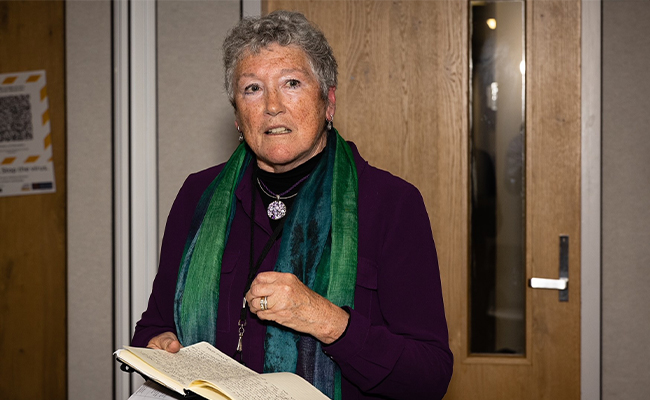
Geography alumna Dr Judith Johnston has created two new scholarships at Otago
Creating opportunities for women to further their study in Geography and supporting them in subjects where they are under-represented at Otago, are the motivating factors behind two new scholarships established by alumna Dr Judith Johnston.
Dr Johnston graduated from Otago with a BA (Hons) in Geography in 1971. She went on to gain her MA at the University of Toronto and PhD at Auckland University. During her distinguished career, she has worked as an academic, a public servant, in the private sector and ran her own consultancy business for two decades.
Offered for the first time this year, the Dr Judith Johnston Scholarship in Geography aims to open up access to women wanting to use their geography skills in their career, while the Dr Judith Johnston Scholarship for Women seeks to increase representation of women in a variety of subjects across the University.
When considering the idea of the scholarships, Dr Johnston decided she wanted “to help women, for whom it was difficult to get to university or to continue university study, to be supported in some way,” she says.
“I’ve come through an era where it was hard to for women to be appointed to or take up many roles, so I felt that I’d like to make it easier for people who perhaps didn’t have the financial support, or who had family commitments.”
The two $5,000 scholarships will be awarded annually, with the Scholarship for Women supporting female undergraduate enrolment in disciplines in which female students at the University of Otago are under-represented, including Finance, Computer Science, Data Science, Economics, Information Science, Mathematics, Statistics, Surveying and Physics.
The scholarship also seeks to support women returning to undergraduate study after a break and is intended to assist candidates in need who are not in receipt of an entrance scholarship.
“In my Geography classes, certainly in my graduate class in Toronto, there were very few women. At Otago I remember it being a big Stage 1 class, but there weren’t many women, you could pick us out quite easily.”
The Geography Scholarship aims to support and encourage female enrolment in 200- and 300-level papers. It will be awarded to one female undergraduate student who, without the benefit of an entrance scholarship, would find it too difficult to afford to return to study.
Dr Johnston says studying Geography opens up a wide range of career opportunities. “For me, it was all the training I got in research methods and analysis. And it was the variety of branches, there’s physical geography, there’s geomorphology, climatology, planning, cultural geography, historical geography – all the various disciplines that you cover, certainly when I went through.
“Behavioural geography was what I particularly enjoyed. There was a book called the Image of the City [by Kevin Lynch] and he talked about how the way we see the world influences the way you behave, and I found that all really fascinating.
“And the way you see the world is with a geographer’s eyes – you see it with the landscape and the man-made pieces put on top of that landscape, you see it with the weather, with the buildings and construction, it’s all part of that environment.”
Otago’s Director of Development and Alumni Relations, Shelagh Murray, says the University greatly appreciates the generous donation from Dr Johnston, and the thought she has put into creating meaningful new opportunities for female students.
“These two scholarships will have a positive impact in two significant ways. They will practically support women through their studies, by removing some of the financial load of completing a degree, and they also have the important aim of encouraging greater representation of women across many subjects.”
Dr Johnston says she “enjoyed the cultural and social geography more than the physical, and I did a lot of historical geography as well. It was something I was good at, I did well at, and at that stage I thought I’d be a teacher of some sort.”
Initially, she followed this path after finishing her tertiary studies, her first job being a Junior Lecturer in Geography at Auckland University. She then worked at the Treasury, before returning to academia at the University of Waikato. She was awarded a Harkness Fellowship in 1978 to look at how to make social science research influence policy making. She did her study at the Massachusetts Institute of Technology (MIT) in the United States and spent some time at Princeton University.
In New Zealand, she became the first Director of the Social Science Research Council, and held the roles of Manager of the research unit at the Department of Health, General Manager and Public Sector Partner at Unisys New Zealand, CIO for the Ministry of Justice and Deputy Director General for the Ministry of Health. One of her career highlights was introducing the National Health Index (NHI) while Deputy General of Health.
In 2003 she set up her own management consultancy business, Judith Johnston Limited, working largely for Government and small companies, with her focus latterly being on governance. She wound up the company three years ago but still does “a few bits and pieces to keep my brain active”.
“I think my specialty was probably as a researcher. I was a good researcher I enjoyed doing research. I had a good analytical mind and most of the jobs I’ve gone into I have been able to use those research and analytical skills. I enjoyed all the opportunities that each of the different jobs gave me.”
A keen traveller and photographer, she is recently back from seeing the Northern Lights in Lapland, and has a trip to the Shetland Islands planned for next year.
“The travelling I just love, and again I think that’s the geographer’s mind. I see the landscape and the people and the industry and the tourism and the scenery, it all comes together for me.”
Kōrero by Margie Clark, Communications Adviser, Development and Alumni Relations Office